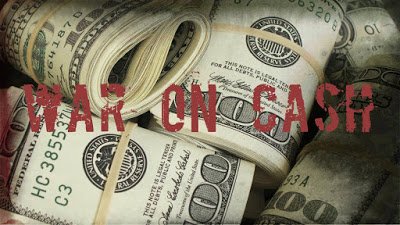War to ban cash is back on as more and more economists calling for a new financial crisis
It was almost exactly a year ago when the mainstream began pushing for governments and central banks to ban or eliminate cash from the monetary system. And as more and more economists hop on board a bandwagon which sees the potential of a new financial crisis just over the horizon, the originator of the idea to eliminate cash is once again ringing the charge to take away the people's freedom over their own financial future.

In a new paper published in the Journal of Economic Perspectives the professor of economics at Harvard University argues that central banks should start preparing now to find ways to cut rates to below zero so they are not caught out when the next recession strikes.
“It makes sense not to wait until the next financial crisis to develop plans and, in any event, it is time for economists to stop pretending that implementing effective negative rates is as difficult today as it seemed in Keynes’ time,” he said.
“The growth of electronic payment systems and the increasing marginalisation of cash in legal transactions creates a much smoother path to negative rate policy today than even two decades ago.”
The key consequence from an economic point of view is that forcing savers to keep cash in an electronic format would make it easier to levy a negative interest rate. “With today’s ultra-low policy interest rates – inching up in the United States and still slightly negative in the eurozone and Japan – it is sobering to ask what major central banks will do should another major prolonged global recession come any time soon,” he said, noting that the Fed cut rates by an average of 5.5 percentage points in the nine recessions since the mid-1950s, something which is impossible at the current low rate of interest, unless negative rates become an option. That would be substantially better than trying to use QE or forward guidance as central bankers have attempted in recent years. - The Telegraph
Yet in addition to Professor Rogoff's clarion call to eliminate cash to save the banks from their own corruption and fraud, a UBS analyst joined in on Aug. 15 calling for Australia to do the same in light of the government's failure to properly regulate banks which are now under indictment for fraud and money laundering.
The Commonwealth Bank money-laundering scandal has given ammunition to the anti-cash crusade, with one analyst asking whether “outdated” $100 and $50 notes are the “root of the problem”.
The nation’s largest bank is facing allegations of more than 53,000 breaches of anti-money laundering and counter-terrorism financing laws, the majority relating to large cash deposits made at CommBank ATMs.
In a note earlier this month, UBS analyst Jonathan Mott said the CommBank scandal raised “four critical questions”.
“Is the root of the problem the outdated high denomination cash notes?” he wrote. “Should Australia move to phase out cash given its role in the black economy (including: proceeds of crime, money laundering, tax avoidance, welfare fraud)?”” – AU News
The ability for individuals to hold physical cash is one of the most important freedoms a society has. And just like in India late last year when Prime Minister Modi eliminated the top two denominations of currency from their monetary system, the end result was economic havoc, and a rebellion by the people to get their money outside of banks before they lost their last modicum of control over what they are allowed to spend it on, save it, or invest it as they see fit.
As an Australian this is a big concern that the war on cash is getting a renewed push. We may not be the clever country, but I remain optimistic that we aren't dumb enough to let cash get banned. Australians have traditionally always had a free and fighting spirit.
Thank you for sharing, valuable and motivational to move into our own cashless system.. Bitcoin!